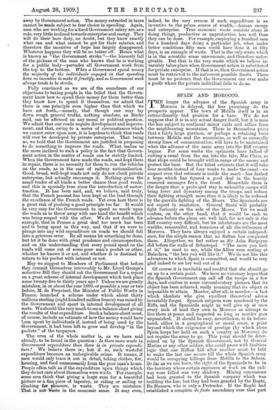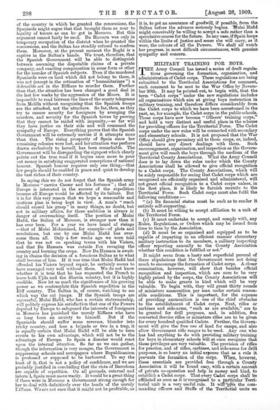SPAIN AND MOROCCO. M la longer the orocco is delayed,
the less promising do the advance of the Spanish army in prospects appear. The town of Melilla itself is in an extraordinarily bad position for a base. We do not suppose that it is in any actual danger itself, but it is none the less subject to continual minor raids and sallies from the neighbouring mountains. These in Vlemselves prove that a fairly large garrison, or perhaps a retaining force between Melilla and the mountains, as well as unusually strong lines of communication, will have to be maintained when the advance of the main army into the Riff country begins. For some weeks the optimists have talked of cutting a canal from the sea into the lake, Mar Chico., so that ships could. be brought within range of the enemy and protect the base. But the latest estimate that it will take four months instead of four weeks to make the canal—we suspect even that estimate is inside the mark—has dashed a hope which has figured a good deal in the heavily censored messages fro n the front. Meanwhile there is the danger that a prolo aged stay in unhealthy camps will bring fever and dysentery among the troops, and. reduce their fighting strength more than it is likely to be reduced by the guerilla fighting of the Moors. The Spaniards are not expert in sanitation. General Sant4, will probably fight furiously on the side of the Moors. Yet we must confess, on the other hand, that it would be rash to advance before the plans are well laid, for not only is the Riff country very difficult, but its inhabitants are the most warlike, resourceful, and tenacious of all the tribesmen of Morocco. They have always enjoyed a certain independ- ence, for the simple reason that no Sultan has conquered them. Altogether, we feel rather as Sir John Burgoyne did before the walls of Sebastopol. "The more you look at it," he used to say, while the Allies were resting at Balaclava, "the less you will like it." We do not like this adventure to which Spain is committed, and would be very glad indeed to see her well out of it.
Of course it is inevitable and needful that she should go on up to a certain point. We have no visionary hopes that the Spanish Government can call off the troops in a few days, and confess in some circumlocutory phrases that its object has been achieved, really meaning that its object is impossible to attain. Murder, after all, is murder,—a fact which idealists who give excellent theoretical advice invariably forget. Spanish subjects were murdered by the Riffs, and the Spaniards might as well give up at once every inch of land they own in Morocco as attempt to live there at peace and respected so long as murder goes unpunished. It should be easy, nevertheless, to fix before- hand, either in a geographical or moral sense, a point beyond which the exigencies of prestige (by which alone Spain keeps her hold on such a country as Morocco) do not require the army to go. This point should. be deter- mined on by the Spanish Government, not by General Marina or any other soldier, who could prove with faultless logic that one Ruffian hill after another must be held to make the last one secure till the whole Spanish army would be occupying hilltops from Melilla to the Sahara. So far as we can learn, the right of the Spaniards to be in the territory where certain engineers at work on the rail- way were killed was very shadowy. Mining concessions had been granted to the Spanish company which was building the line, but they had been granted by the Roghi, Bu Hamra, who is only a Pretender. If the Roghi had established a complete de facto ascendency over that part of the country in which he granted the concessions, the Spaniards might argue that that brought them as near to legality of tenure as can be got in Morocco. But this argument =not fairly be used. Bu Hamara was only in temporary occupation of the district when he granted the concessions, and the Sultan has steadily refused to confirm them. Moreover, at the present moment the Roghi is a captive in the Sultan's hands. We trust, therefore, that the Spanish Government will be able to distinguish between assuming, the disputable claims of a private company, and exacting compensation in some form or other for the murder of Spanish subjects. Even if the murdered Spaniards were on land which did not belong to them, it was not (except in the estimation of "humanitarians ") a defensible act in the Ruffians to murder them. Further than that, the situation has been changed a good deal in the last few weeks by the aggression of the Moors. It is impossible to read between the lines of the scanty telegrams from Melilla without recognising that the Spanish troops are the attacked, not the attackers. So far, then, as they try to ensure security for foreigners by avenging the murders, and security for the Spanish towns by proving that they cannot be raided with impunity,—so far will they have justice on their side and will command the sympathy of Europe. Everything proves that the Spanish Government will be extremely unwise if it attempts mole than this. The rising prosperity of Spain since her remaining colonies were lost, and her attention was perforce drawn exclusively to herself, has been remarkable. The Government will be disregarding the signpost which clearly points out the true road if it begins once more to pour out money in satisfying exaggerated conceptions of national honour. Spanish honour requires only one thing,—that her people should be enabled in peace and quiet to develop the vast riches of their country.
In saying this we do not forget that the Spanish army in Morocco "carries Caesar and his fortunes " ; that all Europe is interested in the success of the expedition because all Europe would be affected by its failure. But it is for this very reason that we hope a reasonable and cautious plan is being kept in view. A man's "reach should exceed his grasp" in many things, no doubt, but not in military affairs, for there ambition is always in danger of overreaching itself. The position of Mulai Hafid, the Sultan of Morocco, is stronger now than it has ever been. For a year we have heard of risings —that of Mulai Mohammed, for example—of plots and revolutions, but one by one Mulai Hafid has over- come them all. Only a few weeks ago we were told that he was not on speaking terms with his Viziers, and that Bu Hamara was outside Fez ravaging the country and burning the crops. Now Bu Hamara is await- ing in chains the decision of a ferocious Sultan as to what shall become of him. If it was true that Mulai Hafid had offended his Viziers beyond repair, he certainly seems to have managed very well without them. We do not know whether it is true that he has requested the French to leave both Ifjda and the Shawia country, but it is highly credible. Now let us mark the significance of his growing power as we contemplate this Spanish expedition in the Riff country. The Sultan is, of course, watching to see which way the cat jumps. If the Spanish troops are successful, Mulai Hafid, who has a certain statesmanship, will politely express his satisfaction that one of the Powers deputed by Europe to safeguard the interests of foreigners in Morocco has punished the unruly Riffians who have so long been an anxiety to himself. But if the Spaniards should suffer some reverses, blunder into tricky country, and lose a brigade or two in a trap, it is equally certain that Mulai Hafid will be able to turn events to his own advantage, which will not be to the advantage of Europe. In Spain a disaster would react upon the internal situation. So far as we can gather, though the information is very meagre, the Government is suppressing schools and newspapers where Republicanism is professed or supposed to be harboured. To say the least of it, that is not a policy of confidence, and we are probably justified in concluding that the riots of Barcelona are capable of repetition. On all grounds, external and intern: 1, Spain must move warily. It would he a great thing if there were in Morocco a Government strong enough for her to deal with definitively over the heads ' of the unruly Tiffians. We are not sure that it might not be profitable, as it is, to get an assurance of goodwill, if possible, from the Sultan before the advance seriously begins. Mulai Hafid might conceivably be willing to accept a safe rather than a speculative course for the future. In any case, if Spain keeps within the limits of justice and sense she will carry, as it were, the colours of all the Powers. We shall all watch her progress, in most difficult circumstances, with genuine sympathy and concern.







































 Previous page
Previous page